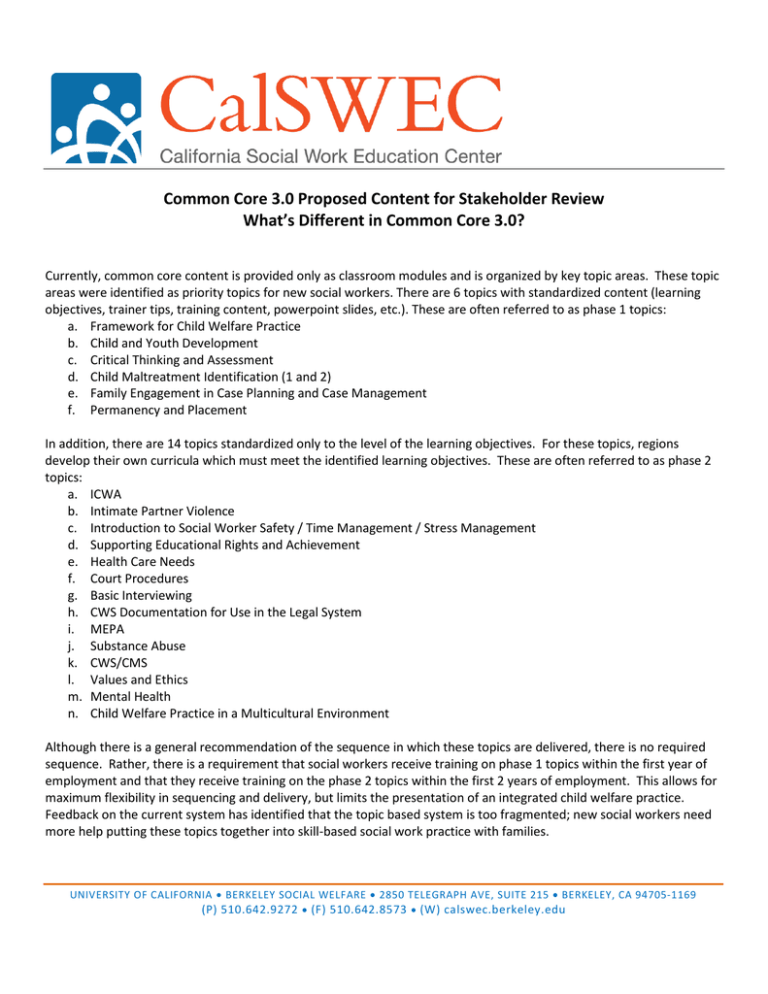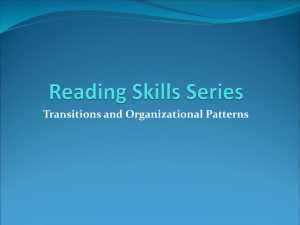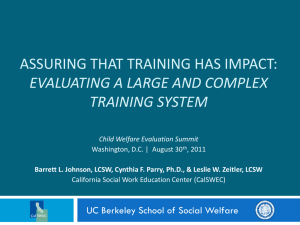Common Core 3.0 Proposed Content for Stakeholder Review
advertisement

Common Core 3.0 Proposed Content for Stakeholder Review What’s Different in Common Core 3.0? Currently, common core content is provided only as classroom modules and is organized by key topic areas. These topic areas were identified as priority topics for new social workers. There are 6 topics with standardized content (learning objectives, trainer tips, training content, powerpoint slides, etc.). These are often referred to as phase 1 topics: a. Framework for Child Welfare Practice b. Child and Youth Development c. Critical Thinking and Assessment d. Child Maltreatment Identification (1 and 2) e. Family Engagement in Case Planning and Case Management f. Permanency and Placement In addition, there are 14 topics standardized only to the level of the learning objectives. For these topics, regions develop their own curricula which must meet the identified learning objectives. These are often referred to as phase 2 topics: a. ICWA b. Intimate Partner Violence c. Introduction to Social Worker Safety / Time Management / Stress Management d. Supporting Educational Rights and Achievement e. Health Care Needs f. Court Procedures g. Basic Interviewing h. CWS Documentation for Use in the Legal System i. MEPA j. Substance Abuse k. CWS/CMS l. Values and Ethics m. Mental Health n. Child Welfare Practice in a Multicultural Environment Although there is a general recommendation of the sequence in which these topics are delivered, there is no required sequence. Rather, there is a requirement that social workers receive training on phase 1 topics within the first year of employment and that they receive training on the phase 2 topics within the first 2 years of employment. This allows for maximum flexibility in sequencing and delivery, but limits the presentation of an integrated child welfare practice. Feedback on the current system has identified that the topic based system is too fragmented; new social workers need more help putting these topics together into skill-based social work practice with families. UNIVERSITY OF CALIFORNIA • BERKELEY SOCIAL WELFARE • 2850 TELEGRAPH AVE, SUITE 215 • BERKELEY, CA 94705-1169 (P) 510.642.9272 • (F) 510.642.8573 • (W) calswec.berkeley.edu In developing the revised common core, our effort is to a. Streamline content to assure that it reflects the knowledge and skills needed for beginning practice b. Identify alternative modalities for delivery of material that promote efficiency and learning c. Provide an integrated picture of child welfare practice for new social workers Our intention is to develop a common core that grounds training in social work practice by providing a foundation of concepts and key information that are interwoven throughout practice (e.g., teaming, ethics, federal and state laws) and then providing training centered on five key practice areas: a. Engagement and Inquiry b. Assessment and Accountability c. Service Planning and Supports d. Monitoring and Adapting e. Transition In addition to reorganizing training around practice areas, the proposed revision concept provides new social workers with opportunities to enhance classroom learning through application of concepts in the field. New social workers would start with a series of 100 level content courses for each practice area. This would provide the entry level knowledge social workers should have as soon as possible after hire. Following completion of 100 level content, social workers would be introduced to the field through case assignment or directed field experiences with supervisors or coaches to support field-based learning. After some field experiences social workers would receive additional 200 level training focusing on application of knowledge in practice. Beyond re-imagining the way social work practice is presented in core, this concept also seeks to incorporate a wider range of training modalities, including on-line learning, classroom learning, coaching, and mentoring. It would also include a range of materials to support transfer of learning and to carry the learning experience into the field. For example, before beginning the series of courses on transition practice, trainees would first complete related foundational classes. Content might include: a. 90 legal procedures online class 1 b. 60 minute social worker safety online class c. 2 hour documentation skills lab d. 30 minute values and ethics online class e. 6 hour teaming basics training f. 6 hour introduction to trauma-informed practice Within the transition practice area, some content will be provided via online modules prior to classroom training. This might include: a. 60 minute online class about case closure b. 60 minute online class about After 18 Trainees would then engage in a daylong pre-service classroom based course focusing on transition practice which might include: a. Planning Transition with Families b. Minimizing trauma at removal and initial placement c. Minimizing trauma in placement changes and transitions – how to make them work for children, youth and families d. The role of visitation in transition planning e. Transitioning to permanency 1 Follow this link to experience an e-learning sample: http://wcwpds.wisc.edu/preservice/introduction/s04/player.html f. Case management during transitions (placement transition, provider transitions, school transitions and including medication and treatment management) g. Managing Transition within Teams h. Case management during worker transitions and changes in the child and family team i. The role of the team in managing transitions Following completion of the initial, pre-service training in the 5 practice areas, social workers would have time in the field to begin developing their social work practice. This "time in the field" concept is flexible and can be adapted to meet county needs and workloads. While specific activities will be identified (including learning objectives and step-bystep instructions for trainees and field advisors) the field activities may be completed over 6 months working in the field as a social worker with a full caseload or during focused field days shadowing experienced social workers and practicing identified skills. After completing the field experience, trainees will participate in additional training to support practice in each of the five practice areas. For example, in the transition practice block, this would involve an additional day of training focused on refining skills related to transition practice. The revised core provides a more comprehensive picture of child welfare practice for new social workers; uses field experiences to ground training in actual social work practice; streamlines learning to focus on key knowledge skills, and values; and uses a variety of training modalities to promote expediency in providing content. Contact For more information, contact Melissa Connelly at CalSWEC [mconnelly@berkeley.edu].


